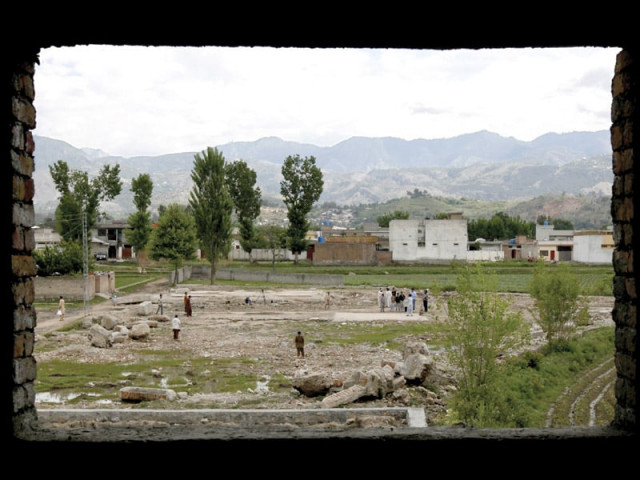Analysis: May Day, May Day!
After receiving ‘actionable intelligence’ it was logical for President Obama to take action without asking...

Hopefully, in keeping with the event’s first ignominious anniversary, the Abbottabad Commission would finalise and submit its report to the authorities by the end of this week.
It is already late by about four months. And hopefully it would answer some of the questions agitating the minds of this nation and the world. For example, did those whose responsibility it is to keep a strict watch on the clandestine traffic of uninvited foreign guests know that Osama bin Laden was “hiding” for the last five years openly only a few kilometres from Pakistan’s premier military academy? If not, why not?
Also, did he have a covert local support infrastructure which allowed him to live with his wives and a large brood of offspring all these years without any fear of being caught? If yes, who were the culprits? And how was it possible that not even the thana in-charge of the area in Abbottabad had felt suspicious enough of the goings-on in a house located in an unusually large compound to find out what was happening inside and who were the inhabitants?
Questions similar to these had perhaps rankled the US president before he took the decision that brought the OBL saga to a bloody end and ruptured, in the aftermath, decades-long close relationship between Pentagon and the GHQ.
When Barack Obama was still a presidential candidate in August 2007 he had warned Pakistan, saying “if we have actionable intelligence about high-value terrorist targets and President Musharraf won’t act, we will. I will not hesitate to use military force to take out terrorists who pose a direct threat to America.”
After receiving what perhaps he concluded to be ‘actionable intelligence’ and perhaps after having asked around the questions posed above and perhaps receiving no conclusive answers but suspecting that Rawalpindi ‘wont act’, if it had not acted so far, it was only logical for President Obama to take the action that he did on the fateful day without taking Islamabad into confidence.
Since then Rawalpindi has acted as if it is more interested in revisiting Pakistan-US relations rather than finding answers to the above questions.
According to newspaper reports, the Abbottabad Commission is likely also to include in its report the sequence of events from the commencement of operation to its completion and exit of its operational personnel from Pakistani territory, the precise conduct of the US raiding and the assassination operation at the OBL compound, and assess the responses of all concerned Pakistani civil, intelligence and military institutions and personnel including their leadership. But then there is no mystery about this aspect of the event. Within a matter of days everyone and his auntie knew how the US accomplished the entire raid and got its personnel back home safely and that it was not technically possible for Pakistan’s defence forces to detect the raid or mount a counterattack.
Between May 2011 and October that year, the debate in the country was focused on two horrendous defence debacles – the Osama raid and the Mehran base attack – that took place within a matter of a few days in the month of May. Instead of looking for the answers from within, those who matter tried to manipulate the entire discourse into a patriotic mumbo jumbo with the US as the main punching bag. As the argument was too thin to last for long, an international court jester was introduced into the narrative with his memogate – an out and out a sting operation. A story, too good to be true but carried the so-called officially-sanctified credibility as the former ISI chief General Pasha had vouched for its reliability. This turned the focus on a total non-issue – the poor Hussain Haqqani and his patriotic credentials. By January this year this story too got lost in its own contradictions but those who never say die have found a godsend in the Supreme Court’s short ruling in Prime Minister Yousuf Raza Gilani’s contempt case. Now the national debate is focused on whether or not the PM stood disqualified. And to the utter disillusionment of democratic forces in the country the two mainstream national political parties – the PPP and the PML-N – after having wisely remained on the same side of the fence vis-à-vis the establishment all these nearly five years, once again find themselves on the opposite sides and locked into an eyeball-to-eyeball confrontation creating the much-needed space for you-know-who to creep back to its former position of political predominance.
It would not have been lost on either the chief justice of Pakistan or the president of the country, or even the leader of the main opposition, that on Tuesday the Chief of the Army Staff General Kayani was pronouncing his words of wisdom – that the country’s development and welfare depended on functioning of state institutions within their constitutional limits – from a higher moral pedestal which his institution had lost with the ouster of Musharraf.
(Read: Tribune’s Gamechangers 2011: Osama bin Laden & Seal team 6)
Published in The Express Tribune, May 2nd, 2012.



















COMMENTS
Comments are moderated and generally will be posted if they are on-topic and not abusive.
For more information, please see our Comments FAQ